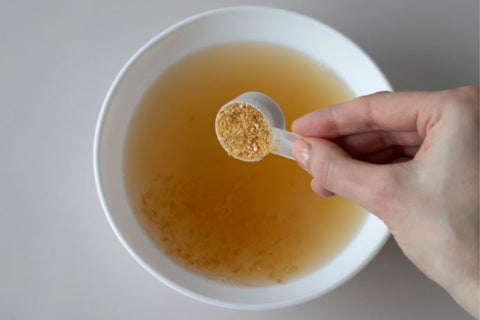Bone broth and bone broth protein are two variations of a popular nutritional product derived from animal bones. While both share a common origin, they differ significantly in form, concentration, ease of use, and nutritional content.
The article will delve into the differences between bone broth and bone broth protein, highlighting their respective forms, concentrations, ease of use, portability, collagen content, shelf life, dietary considerations, flavour options, protein content, and cost-effectiveness. By examining these factors, readers will gain insights into which option best suits their needs and lifestyle preferences, considering factors like convenience, nutritional density, and dietary restrictions.
Form
Bone broth and bone broth protein have become popular for their potential health benefits. Bone broth is a liquid made by simmering animal bones, while bone broth protein is a dehydrated and powdered form of the broth.
But how do they differ, and what form do they come in? Let's break it down:
- Bone Broth: This is a liquid stock made by simmering bones, vegetables, herbs, and sometimes meat for many hours. It's typically consumed as a beverage or used as a base for soups and stews.
- Bone Broth Protein: This is a powdered supplement made from concentrated bone broth. The broth goes through a dehydration process, often with spray drying, to turn it into a shelf-stable powder.
Here's how they differ in preparation:
- Bone Broth: This is a traditional method where bones, along with other ingredients, are simmered in water for an extended period, typically 12 to 24 hours or even longer. This slow simmering process is said to extract nutrients from the bones, like collagen and minerals.
- Bone Broth Protein: Here, bone broth is made first using the same simmering process. Then, the broth is dehydrated at low temperatures to concentrate the protein and other nutrients before being ground into a powder. This method offers convenience but may affect some heat-sensitive nutrients.
Concentration
Here's the deal with a concentration in bone broth versus bone broth protein. Bone broth protein is a more concentrated source of the nutrients found in traditional bone broth, as it is typically processed to remove water content.
Concentration of Bone Broth:
- Regular bone broth is simmered for a long time, but it's still a liquid. This means the water content is quite high, and the nutrients and protein from the bones are diluted within the broth.
Concentration of Bone Broth Protein:
- Bone broth protein takes things a step further. After the initial simmering process to create bone broth, the liquid is concentrated. This can involve methods like evaporation or spray drying to remove a significant amount of water.
Bone Broth Protein vs. Traditional Broth - Concentration Comparison:
- Bone broth protein is significantly more concentrated than traditional bone broth in terms of protein and other nutrients per serving. A scoop of bone broth protein powder is claimed to be equivalent to several cups of regular bone broth regarding its nutrient content.
Here's the trade-off:
While bone broth protein offers a concentrated punch of nutrients, the dehydration process might affect some heat-sensitive compounds present in traditional bone broth.
Ease of Use
Bone broth has been a popular health food for centuries, but its simmering process can be time-consuming. Here's how bone broth protein powder makes things easier compared to traditional bone broth:
Convenience:
- Simpler Prep: Bone broth simmers for hours, while a scoop of bone broth protein powder mixes easily into water or your favourite beverage.
- Faster Consumption: No need to wait for hours of simmering or reheating broth. Just mix and go!
Portability:
- Lighter & Easier to Store: Bone broth protein powder is lightweight and takes up minimal space in your pantry or bag. Carrying a container of broth can be bulky and heavy.
Dosage Control:
- Consistent Protein: A scoop of bone broth protein provides a known amount of protein, whereas the protein content in homemade broth can vary.
Portability
Bone broth has become a popular health food, but its bulky nature can be a drawback, especially if you're looking for a convenient protein source to take with you on the go. Bone broth protein powder offers a more portable alternative, but how much does it sacrifice in terms of versatility? Here's the breakdown:
Portability:
- Traditional Bone Broth: Bulky and Heavy - Carrying a container of broth can be cumbersome, especially if you're travelling or on the go. It requires refrigeration and isn't ideal for carrying around.
- Bone Broth Protein Powder: Lightweight and Compact - A container of bone broth protein powder is lightweight and takes up minimal space in your bag or pantry. It's perfect for travel, work, or the gym.
Versatility:
- Traditional Bone Broth: Limited Consumption - You typically consume bone broth hot, as a beverage or base for soups and stews.
- Bone Broth Protein Powder: Multiple Uses - Bone broth protein powder offers much more versatility. Mix it with water, milk, smoothies, or yogurt, or even oatmeal or baked goods for a protein boost. This makes it a convenient way to incorporate protein into your diet throughout the day.
Collagen Content
Bone broth and bone broth protein both contain collagen, a protein crucial for healthy joints, skin, and gut health, but there are some key differences in how much collagen they contain and how your body absorbs it. Here's a breakdown to understand what sets them apart:
Collagen Source:
- Bone Broth: Imagine simmering bones, cartilage, and connective tissues for hours. This slow-cooking process naturally breaks down the collagen within these tissues, releasing it into the broth. The resulting broth contains a mix of different collagen types (types I, II, III, etc.) depending on the animal source (beef, chicken, fish) used for the broth.
- Bone Broth Protein: This is a more concentrated source of collagen. It's typically made by extracting collagen peptides from various sources like bones, hides, or even eggshells. This extraction process isolates and purifies the collagen protein, resulting in a higher amount of collagen per serving compared to traditional bone broth. However, this process may focus on specific collagen types depending on the extraction method.
Processing and Absorption:
- Bone Broth: The lengthy simmering time in traditional bone broth breaks down collagen into smaller components called collagen peptides. These peptides are generally easier for your body to absorb compared to larger collagen molecules. However, the total amount of collagen in the broth can vary depending on the simmering time, the type of bones used, and other factors.
- Bone Broth Protein: The processing methods used to create bone broth protein can further break down the collagen molecules into even smaller peptides. This further enhances absorption by your body. However, this additional processing might also affect the specific benefits associated with different collagen types. For example, some collagen types may be more beneficial for skin health (type I) while others may be better for joints (type II).
Shelf Life
Bone broth has become a popular health drink, lauded for its gut-boosting properties and rich source of protein. But when it comes to convenience, bone broth protein powder offers a shelf-stable option compared to liquid broth. Let's dive into the difference in shelf life between these two and how they stack up against homemade broth.
Shelf Life Showdown:
- Liquid Bone Broth: Homemade bone broth typically lasts for 5 days in the refrigerator and up to 1 year in the freezer. Store-bought versions may have a slightly longer shelf life due to processing methods, usually lasting 4-6 days after opening when refrigerated.
- Bone Broth Protein Powder: This dehydrated form boasts a significantly longer shelf life. Most brands will have a "Best Before" date ranging from 18 months to 2 years from the production date.
The Science Behind Shelf Life:
- Moisture Matters: Liquid bone broth provides a breeding ground for bacteria, hence its shorter shelf life. Dehydration removes moisture from bone broth protein powder, significantly reducing bacterial growth and spoilage.
- Processing Power: Store-bought bone broths often undergo pasteurization, a heat treatment that eliminates harmful bacteria and extends shelf life.
Dietary Restrictions
Bone broth protein powder has emerged as a game-changer for those navigating dietary limitations. Here's why it can be a valuable addition for people with dietary:
- Minimal Ingredients: Unlike store-bought broths, bone broth protein powder often has a simple ingredient list, free from common allergens like gluten, soy, and dairy. This makes it a safe choice for people with food sensitivities or following restricted diets like paleo or keto.
- Customization Potential: Unflavored bone broth protein powder boasts incredible versatility. You can easily incorporate it into various dietary needs. Here are some ideas:
- Blend it into smoothies for a protein and nutrient boost.
- Add it to soups, stews, or sauces to increase protein content without significantly altering the flavour profile.
- For a baked good protein boost, sneak it into muffins, breads, or pancakes.
Flavor Options
Bone broth protein powder goes beyond the savoury realm of traditional broth, offering a surprising array of flavours to cater to various taste bud preferences. Here's how these options broaden the appeal of bone broth protein:
Gone are the days of bland protein powder. Bone broth protein powder comes in a wide variety, allowing you to find one that suits your taste:
- Savoury Classics: For those who enjoy the traditional bone broth taste, there are options like beef, chicken, or roasted garlic. These flavours blend seamlessly into savoury dishes like soups, stews, or sauces.
- Sweet and Fruity: If you prefer a sweeter taste, there are fruit-flavoured varieties like berry, peach, or mango. These options are perfect for mixing into smoothies or creating protein-packed yogurt parfaits.
- Spice it Up: Craving a Kick? Look for bone broth protein powders with spices like ginger, turmeric, or chilli. These add an exciting twist to smoothies or can be used in savoury recipes like curries or chilli.
- Unflavoured Base: For maximum versatility, unflavored bone broth protein powder allows you to customize the taste according to your preference. You can add it to smoothies, soups, or baked goods without overpowering the existing flavours.
The wide range of flavours makes bone broth protein powder a great option for those who might find plain broth unappealing. With so many options, you can find a flavour that complements your taste buds and dietary needs, making it easier to incorporate protein into your daily routine.
Protein Content
Bone broth has become a popular health drink in recent years, touted for its potential benefits for gut health, joints, and skin. But if you're specifically looking for a protein boost, bone broth protein might be a better choice. Let's dive into the difference between their protein content.
Bone Broth vs. Bone Broth Protein: Protein Content
Bone broth, as discussed above, is traditionally made by simmering bones with water and vegetables for many hours. This process extracts nutrients from the bones, including collagen, minerals, and some protein. However, the protein content in bone broth is relatively low. A cup of bone broth typically contains around 10 grams of protein.
Bone broth protein powder, on the other hand, is a concentrated source of protein. It's made by taking regular bone broth and dehydrating or filtering it to remove water and concentrate the protein and other nutrients. This process can result in a bone broth protein powder that has several times the amount of protein per serving compared to regular bone broth. A scoop of bone broth protein powder can often contain around 20 grams of protein.
Cost and Convenience
While making homemade bone broth can be cost-effective, bone broth protein offers a convenient and time-saving option for those who may not have the time or resources to prepare traditional broth regularly.
When it comes to bone broth and bone broth protein, the battle lines are drawn between affordability and convenience. Here's a breakdown:
Bone Broth:
- Cost: Budget-friendly. Making your bone broth is very cost-effective. You just need bones (which can be inexpensive or even free from your butcher) and basic aromatics like vegetables. A pot of homemade bone broth can cost as little as a few dollars.
- Convenience: Time-consuming. Simmering bones for many hours is a commitment. While you can set it and forget it, it requires planning and foresight. There are also store-bought options, but they tend to be pricier per serving compared to homemade.
Bone Broth Protein:
- Cost: More expensive per serving. Bone broth protein powder undergoes additional processing, making it more expensive than homemade bone broth. A container of bone broth protein powder can range from $20 to $50, depending on the brand and protein content.
- Convenience: Highly convenient. A scoop of bone broth protein powder can be easily mixed into water, smoothies, or yogurt for a quick protein boost. It's perfect for busy lifestyles where time for elaborate broth-making is limited.
Cost-Effectiveness of Homemade vs. Convenience:
Homemade bone broth wins hands down in the cost department. However, the convenience factor of bone broth protein can't be ignored. Here's how to decide:
- If budget is your primary concern: Making your bone broth is the clear winner. You can stock up on inexpensive bones and whip up a batch whenever you need it.
- If convenience is a priority: Bone broth protein is a great option. It's a quick and easy way to get your protein fix without the time commitment of making broth from scratch.
Conclusion
Understanding the differences between bone broth and bone broth protein allows you to make an informed choice based on your lifestyle and health goals. Whether you prioritize convenience, concentration, or dietary considerations, both options offer valuable nutritional benefits.
Key Takeaways
- Bone broth is a liquid made by simmering bones, vegetables, and herbs, while bone broth protein is a dehydrated powder made from concentrated bone broth.
- Bone broth protein is more concentrated than traditional bone broth, offering higher nutrient density per serving.
- Bone broth protein is easier and quicker to prepare, making it more convenient for daily consumption.
- Bone broth protein powder is lightweight and portable, ideal for on-the-go use compared to liquid bone broth.
- Both contain collagen, but bone broth protein often offers a higher concentration due to processing methods.
- Bone broth protein powder has a longer shelf life compared to homemade or store-bought liquid bone broth.
- Bone broth protein powder is often free from common allergens, making it suitable for various dietary restrictions.
- Bone broth protein comes in various flavours, enhancing its versatility and appeal.
- Bone broth protein is a more concentrated source of protein compared to traditional bone broth.
- While homemade bone broth is cost-effective, bone broth protein offers greater convenience for busy lifestyles.





